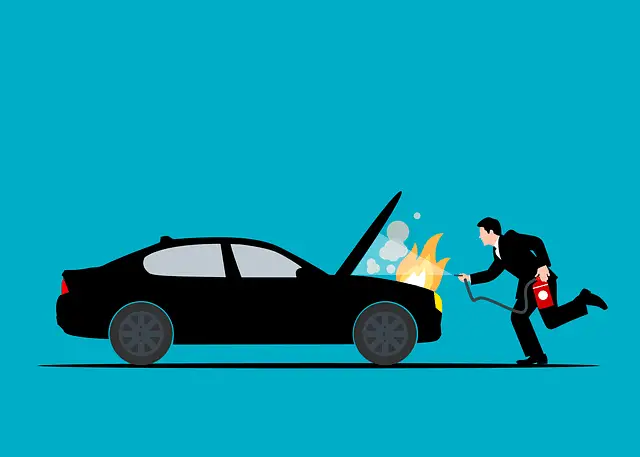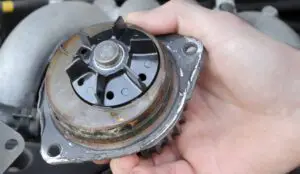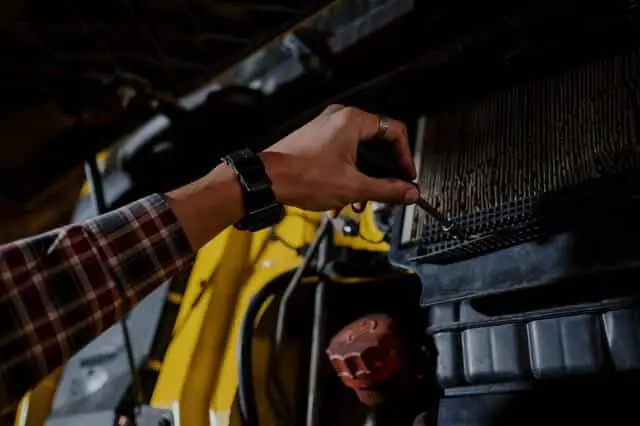Car overheating is never a good thing. It’s important to know what to do when your car overheats and the most common reasons for this happening in the first place. We’ll help you out with what to do if your car is overheating by discussing some of the most common reasons for it happening, as well as how best to remedy the situation!
Why is your Car Overheating? (Common Reasons)

There are many reasons why your car may overheat. From a faulty thermostat to an engine that is too small, many different things can cause the temperature inside your car’s engine to rise.
Note
Your car can heat for various reasons such as Cooling System Failure, Radiator might not be working, Faulty belts or hoses, low oil, lousy thermostat, or failing water pump.
1. Cooling System Failure

When your car is overheating, it may be a problem with your vehicle’s cooling system. This includes issues with the radiator, water pump, or thermostat. It could also mean that there isn’t enough coolant in the engine to reduce internal heat and maintain normal engine temperature levels.
2. Radiator Problems
If the radiator is not working correctly, it can cause your car to overheat. This may be due to a clogged radiator, a broken fan belt, or low coolant levels. If you have any of these problems, it’s essential to get them fixed as soon as possible to prevent further damage to your engine.
3. Faulty Belts or Hoses
If one of the belts that drives the cooling system breaks or comes loose, it can cause your car’s engine temperature to rise quickly. The same goes for hoses that are cracked or leaking fluid. If you notice that any of these parts seem damaged, make sure you get them repaired right away. Low Oil Levels
4. Low Oil
One common reason for an overheating engine is low oil levels. When the oil level is too low, it can’t properly lubricate the engine and prevent it from overheating. If you think that your car may be running low on oil, make sure to add more as soon as possible. Bad Thermostat
5. Bad Thermostat
If the thermostat in your car isn’t working correctly, it can cause the engine to overheat. This may be due to a faulty thermostat or one stuck closed. If you suspect that your thermostat isn’t working correctly, have it replaced as soon as possible. Failing Water Pump
6. Failing Water Pump
The water pump helps circulate coolant through the radiator and engine. If this pump fails, it can quickly lead to an overheating engine. If you suspect that your water pump is failing, it’s essential to get the problem fixed as soon as possible.
The following are some of the most common reasons for overheating a car engine. While there may be other causes, these are the most likely ones and can usually be easily repaired by an experienced mechanic.
What to do When a Car Overheats?
You can try below few things if your car overheats:
1. Shut Off Your Air Conditioner
If you notice that your car is overheating, the best thing to do right away is to shut off your air conditioner—this will take a lot of pressure off what’s going on under the hood and hopefully stop any excess heat from ruining what’s inside.
2. Turn On Your Heater and Blower
Another fix for an overheated engine is switching on your heater, so it blows hot air onto what’s underneath the hood. This can help reduce some of making things too hot in there!
3. Try Not To Ride The Brakes
One last tip when checking out why a car might overheat could be not riding down hard on the brakes because this causes extra pressure into what we call “the combustion
chamber” and what we typically refer to as the engine. When this happens, it can lead to overheating issues with your car since there is not enough airflow going through the radiator—it doesn’t have enough time to cool down along its way through!4. Shift Into Neutral or Park and Rev The Engine a Little
If you notice that your car is hot from being on for too long, shift into neutral so what goes inside of the “combustion chamber” has more air coming in from what we commonly refer to as the fan blades, which are manually attached by turning them clockwise. This will allow more air into what creates our heat which should prevent overheating issues long-term.
5. Know when to call a mechanic.
If your car is overheating, it’s essential to take action right away to prevent further damage. However, if you’re not sure what the problem is or how to fix it, it’s best to call a mechanic for help. They can diagnose the issue and fix it ASAP.
These are a few things that you can try if your car overheats. I recommend calling a mechanic
FAQS about Car Overheating
You may also like:
- How Often Do You Need to Service Your Car?
- Things to Do if Car Overheats and Shut Off
- Does Coolant Affect Car Air Conditioning?
Ending Note
Everyone knows how annoying it can be to drive around with a hot engine under the hood, making your fan belt squeal every time you turn on the air conditioner. Worse than just being obnoxious, though, is when your cooling system starts having problems and your car engine overheats.
So, if you’re experiencing this problem, make sure to take it to an experienced mechanic (If you can not fix it) as soon as possible so that the issue can be diagnosed and repaired before any further damage is done.

